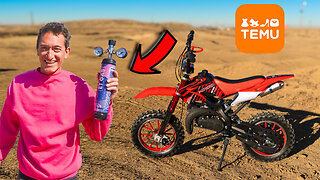Premium Only Content

Fatties Most Epic and Hilarious Bloopers!🤦♂️
<The reason fat men are good natured is they can neither fight nor run>
When considering a topic like "Fatties Worst Bloopers," it's crucial to approach it thoughtfully and responsibly. Here are some notes to consider:
Understanding the Phrase
Terminology Sensitivity:
The term "fatties" can be derogatory or offensive when referring to people of larger body sizes. It's important to recognize the sensitivity around body image and weight and to use respectful language. A more respectful term might be "funny bloopers involving larger people" if the context is necessary.
"Bloopers" Definition:
"Bloopers" refer to funny or awkward mistakes caught on camera. These can be from sports, television, movies, or everyday life. They are usually lighthearted and meant to entertain by showcasing human errors and mishaps.
Types of Content
YouTube and TikTok Compilations:
These platforms often have videos compiling various funny moments, sometimes themed around certain groups or activities. Titles like "Fatties Worst Bloopers" might appear, though they should ideally be framed positively to avoid offending audiences.
Sports and Physical Comedy:
In sports, bloopers often involve funny mistakes, like dropping the ball, tripping, or other clumsy actions. Videos might show athletes or regular people having humorous accidents, with no intent to mock their size.
Television and Reality Shows:
Many TV shows, especially those focusing on reality or competitions, have segments highlighting funny errors or outtakes. These bloopers provide behind-the-scenes looks at unplanned and unscripted moments.
Considerations for Creating or Sharing Content
Respect and Inclusivity:
When creating or sharing content under such titles, it's crucial to ensure it is respectful and not perpetuating stereotypes or body shaming. Humor should come from the situation, not at the expense of someone's body size.
Audience Sensitivity:
Be aware of how different audiences might perceive the content. What one group finds funny, another might find offensive. Striking a balance and aiming for universal humor can help avoid alienating viewers.
Content Context:
Providing context can help. For example, if showcasing sports bloopers, explain the context of the mistake (like a challenging move or a funny accident) rather than focusing on the person's size.
Positive Framing:
Frame the content in a way that highlights the humor of the situation without targeting an individual's appearance. Titles and descriptions can focus on the funny moment rather than the person's body size.
Ethical and Social Considerations
Body Positivity:
Promoting body positivity and inclusivity is important. Content should not demean or ridicule individuals based on their body size. Instead, focus on celebrating the diversity of human experiences and humor.
Avoiding Stereotypes:
Avoid reinforcing negative stereotypes about people of larger sizes. Content should be mindful not to suggest that bloopers are funnier because of someone's size.
Encouraging Empathy:
Encourage viewers to laugh with the individuals involved, not at them. Empathy can transform how bloopers are perceived and enjoyed.
Examples and Alternatives
Example Titles:
Instead of "Fatties Worst Bloopers," consider titles like "Hilarious Sports Mishaps" or "Funniest Accidental Moments."
Positive Examples:
Videos that show people of all sizes having funny moments, such as tripping in a silly way or making a goofy mistake, without focusing on body size, can be just as entertaining and more inclusive.
Alternatives:
Explore blooper themes that are universally relatable, like "Best Dog Bloopers" or "Kids' Funniest Fails," which can entertain without touching on potentially sensitive topics.
Conclusion
While "Fatties Worst Bloopers" can be interpreted in a variety of ways, it's essential to handle such content with care to avoid offending or alienating audiences. Focus on creating or sharing content that is inclusive, respectful, and genuinely funny for all viewers.
-
 LIVE
LIVE
Barry Cunningham
2 hours agoPRESIDENT TRUMP HAS DRIVEN THE DEMOCRATS OFF OF A CLIFF! THEY WILL NEVER RECOVER!
6,662 watching -
 LIVE
LIVE
FreshandFit
2 hours agoFormer Fed Explains Diddy Trial Day 3. Cassie Takes The Stand!
4,115 watching -
 LIVE
LIVE
Badlands Media
16 hours agoAltered State S3 Ep. 28
3,308 watching -
 25:32
25:32
The Rad Factory
5 hours ago $0.01 earnedTesting Temu Pit Bike Upgrades
3.58K -
 LIVE
LIVE
Dr Disrespect
10 hours ago🔴LIVE - DR DISRESPECT - PGA 2K25 - ALL NEW SEASON 2!
1,471 watching -
 LIVE
LIVE
Geeks + Gamers
1 hour agoGeeks + Gamers Play Among Us
158 watching -
 LIVE
LIVE
Mally_Mouse
5 hours agoLet's Play!! -- P.O. Unboxing and more!
220 watching -
 53:26
53:26
Sarah Westall
2 hours agoPower and Money: The Epic Clashes Between Commanders in Chief and Titans of Industry w/ Tevi Troy
24.5K1 -
 LIVE
LIVE
Melonie Mac
2 hours agoGo Boom Live Ep 48!
389 watching -
 LIVE
LIVE
Spartan (Pro Halo esports Player)
9 hours agoStar Wars for a bit, then warming up for Shopify Scrim @ 4 EST
34 watching